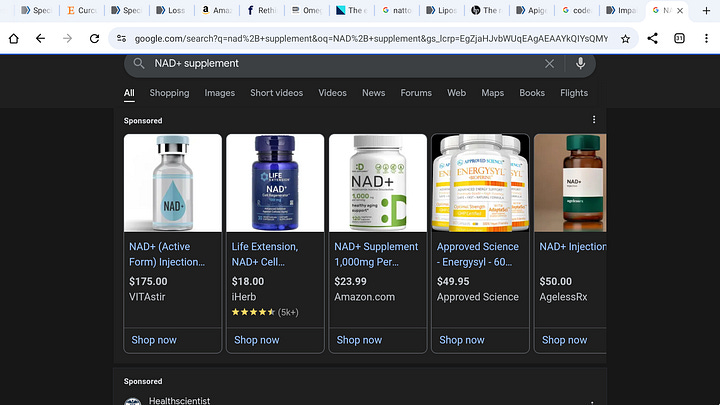Type I Diabetes, NAD+, Retinopathy along with many other complications. NR, NAD+ Nicotinic Acid, possibly NMN, others can raise/restore NAD levels.
This is the correct way to prevent the associated damage that diabetes is responsible for, this and "possibly" a ketogenic diet. Apigenin blocks CD38, which degrades NAD, another possible option.
READ EVERY WORD:
https://pmc.ncbi.nlm.nih.gov/articles/PMC7610120/
Abstract
One of the biochemical abnormalities found in diabetic tissues is a decrease in the cytosolic oxidized to reduced forms of the nicotinamide adenine dinucleotide ratio (NAD+/NADH also known as pseudohypoxia) caused by oxidation of excessive substrates (glucose through the polyol pathway, free fatty acids and lactate).
Subsequently, a decline in NAD+ levels as a result of the activation of poly adenine nucleotide diphosphate‐ribose polymerase (mainly in type 1 diabetes) or the inhibition of adenine nucleotide monophosphate‐activated protein kinase (in type 2 diabetes).
Thus, replenishment of NAD+ levels by nicotinamide‐related compounds could be beneficial. However, these compounds also increase nicotinamide catabolites that cause oxidative stress.
This is particularly troublesome for patients with diabetes, because they have impaired nicotinamide salvage pathway reactions at the level of nicotinamide phosphoribosyl transferase and phosphoribosyl pyrophosphate, which occurs by the following mechanisms.
First, phosphoribosyl pyrophosphate synthesis from pentose phosphate pathway is compromised by a decrease in plasma thiamine and transketolase activity. Second, nicotinamide phosphoribosyl transferase expression is decreased because of reduced adenosine monophosphate‐activated protein kinase activity, which occurs in type 2 diabetes.
The adenosine monophosphate‐activated protein kinase inhibition is caused by an activation of protein kinase C and D1 as a result of enhanced diacylglycerol synthesis caused by pseudohypoxia and increased fatty acids levels. In this regard, nicotinamide‐related compounds should be given with caution to treat diabetes.
To minimize the risk and maximize the benefit, nicotinamide‐related compounds should be taken with insulin sensitizers (for type 2 diabetes), polyphenols, benfotiamine, acetyl‐L‐carnitine and aldose reductase inhibitors. The efficacy of these regimens can be monitored by measuring serum NAD+ and urinary nicotinamide catabolites.
Keywords: Adenosine monophosphate‐activated protein kinase, Nicotinamide, Nicotinamide adenine dinucleotide
In the context of type 1 diabetes, research suggests that impaired nicotinamide adenine dinucleotide (NAD+) metabolism, including a decline in NAD+ levels, can exacerbate diabetic complications. NAD+ is a critical molecule involved in various metabolic processes, and its deficiency can contribute to issues like oxidative stress and impaired mitochondrial function.
Elaboration:
NAD+ and Diabetes:
NAD+ plays a crucial role in cellular energy production and various metabolic pathways. In type 1 diabetes, imbalances in NAD+ metabolism can contribute to complications like diabetic neuropathy and kidney disease.
NAD+ Decline in Type 1 Diabetes:
Studies indicate that NAD+ levels can decline in diabetic tissues, potentially due to the activation of poly(ADP-ribose) polymerase (PARP), which consumes NAD+ as a substrate, especially in type 1 diabetes.
Consequences of NAD+ Deficiency:
Lower NAD+ levels can lead to increased oxidative stress, which damages cells and tissues, and impaired mitochondrial function, which reduces energy production. These effects can contribute to various complications of diabetes, such as diabetic neuropathy and kidney disease.
Potential Interventions:
Some research suggests that replenishing NAD+ or modulating its metabolism could be a potential therapeutic strategy for type 1 diabetes, potentially improving beta-cell function and reducing inflammation. For example, nicotinamide, a precursor to NAD+, has been shown to improve beta-cell function in some studies.
Ongoing Research:
The role of NAD+ in the development and progression of type 1 diabetes is an active area of research, with ongoing studies exploring the potential of NAD+ boosters or other interventions to mitigate diabetic complications.







